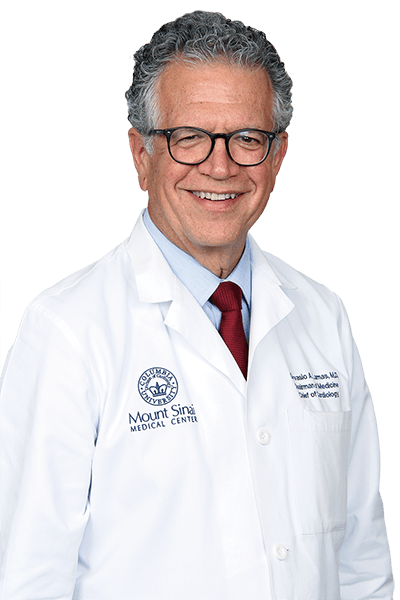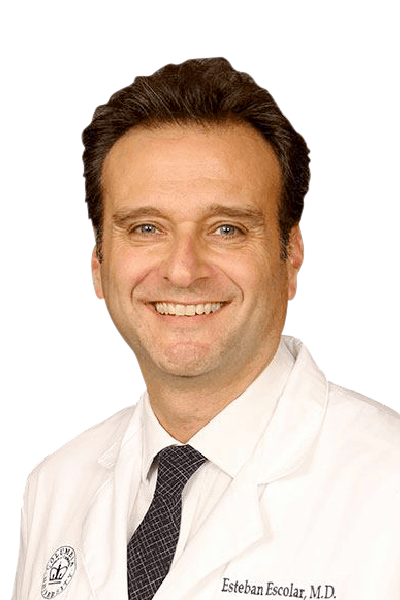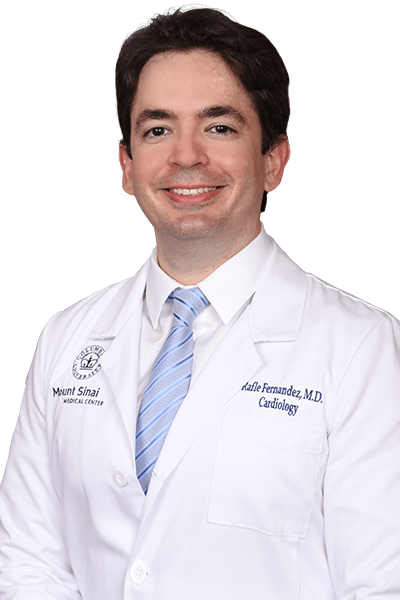Clinical Cardiology
What Is Clinical Cardiology?
We use a lot of terms to describe conditions that affect the heart and circulatory system: cardiovascular disease, cardiac disease, and of course, heart disease. We also have a wide range of experts who work to treat diseases of the heart, with clinical cardiologists at the center of the nexus.
At Mount Sinai Medical Center, home to the Mount Sinai Heart Institute, and at medical centers around the world, clinical cardiologists oftentimes are the central physicians in the treatment and management of cardiac disease. But what is a cardiologist, and what is clinical cardiology?
The Heart Of Your Heart Care
Cardiologists are highly trained doctors who specialize in disease and conditions of the heart and circulatory system – the system responsible for pumping blood through the body and delivering life-giving oxygen to every human cell. Of course, the heart is the central organ in the circulatory system, and similar to the heart, your Mount Sinai cardiologist is likely the central figure in your cardiac team.
Cardiologists start their journey as medical professionals under the broad study of “internal medicine,” which includes nearly every type of health care, with the exception of surgery. Then, they go on to spend additional years training specifically in disease and conditions of the heart, focusing on non-surgical approaches to heart care, along with coordination among a team of other cardiac experts in allied fields of study. So, when you think of your Mount Sinai cardiologist, you can trust that she or he is the “conductor” or your heart health plan, applying all the medical care necessary to take care of you and your heart. In addition, your Mount Sinai cardiologist will identify the necessary sub-specialists to provide the expert care required for advanced cardiac interventions should you require cardiac surgery, diagnostics and testing, or interventions that use catheters to repair structures in your heart or in blood vessels, as well as electrophysiology, which treats those parts of the cardiovascular system that focus on the natural current that keeps the heart pumping.
Your Partner For Long-Term Heart Health
Because clinical cardiologists are so central to your heart care, many patients stay with their Mount Sinai cardiologist for years. Your cardiologist becomes a vital part of your overall health care team, ensuring proper coordination of care. She or he will likely use an array of data collected from different tests to understand your personal cardiac circumstances. Then, your Mount Sinai cardiologist will prescribe a treatment plan that may include non-surgical and surgical interventions to correct heart problems, to prevent escalation of whatever problem you’re facing, or to prevent other diseases that sometimes happen to people with certain cardiovascular disease. We call these co-morbidities.
Types Of Cardiologists
We classify cardiology into three main categories – invasive cardiology, non-invasive cardiology, and interventional cardiology. Remember, your Mount Sinai cardiologist is not a surgeon, but she or he can perform procedures to correct problems inside your body without an operation that requires opening the chest.
While cardiologists can perform procedures, when we specifically use the term clinical cardiology, we are usually referring to non-invasive approaches to heart care. These approaches included important tests such as:
- Echocardiography, which uses ultrasound to “see” the heart and evaluate its function and structures
- CT scans to provide 3-D images of the heart and blood vessels
- Nuclear tests that use radioactive elements to evaluate cardiac function
- Stress tests to monitor heart function when you’re exercising or exerting more energy than normal
- Remote heart monitoring to get a long-term view of how your heart functions over several days
Frequently, prescription medication, dietary changes, carefully-studied nutritional supplements, exercise programs, and mental health treatment are part of your medical cardiologist’s tool kit for getting and keeping you healthy.
What We Treat
Almost every patient with cardiovascular disease can benefit from the care and coordination of a clinical cardiologist, even those who undergo major heart surgeries or suffer from serious cardiac events like heart attack. However, on a day-to-day basis, your clinical cardiologist at Mount Sinai more frequently focuses on disease that benefits from medical management with prescription drugs, lifestyle changes, and careful monitoring. Broadly, these types of cardiac conditions include:
Arrhythmias
This is a category of heart conditions where the heart beats irregularly. It could be someone’s heart beats too fast (tachycardia), too slow (bradycardia), skipping beats, or having extra beats. Often, your Mount Sinai cardiologist will prescribe medication to correct your heartbeat as well as blood thinners, because irregular heartbeats can prevent blood from leaving the heart. When this happens, blood can pool inside the heart and thicken or cause a clot. These clots can lead to a stroke, so blood thinners help prevent the blood from clotting
Atherosclerosis
This happens when fat and other waste gets stuck inside the arteries. We call the buildup plaque, and it can block blood from flowing freely through the arteries. In some cases of atherosclerosis, cholesterol causes the arterial walls to become thick or stiff. This can also prevent blood from flowing well. Mount Sinai’s clinical cardiologists may prescribe a class of medication called statins to help reduce the amount of cholesterol in your blood, which contributes to atherosclerosis. Other types of medication can also help, as well as quitting smoking, eating different kinds of foods, and exercise.
Atrial Fibrillation
This is a specific kind of irregular heartbeat, or arrhythmia. With atrial fibrillation, the top two chambers of the heart, called atria, get interrupted electrical signals, causing the irregular heartbeat. With less regular, less forceful heartbeats, blood can pool inside the heart where it can thicken and clot. The potential for clots, which can travel to the brain and cause a stroke, is the biggest concern for patients with A-fib. At Mount Sinai, your clinical cardiologist will likely start your treatment regimen with medications to help stabilize your heat beat, along with blood thinners to prevent clots from forming. In recent years, new drugs have been developed that are quite effective in protecting patients from strokes from these blood clots.
Cardiomyopathy
This condition refers to the actual heart muscle. With cardiomyopathy, the heart muscle becomes less flexible and weaker. For patients with cardiomyopathy, their weaker heart muscles can mean poor blood flow, especially to the limbs. When the blood becomes congested in the vessels of the arms and legs, it can collect in peoples’ ankles and feet. At Mount Sinai, our clinical cardiologists may prescribe blood thinners, as well as beta-blockers and calcium channel-blockers, to prevent this type of blood congestion associated with
Coronary Artery Disease
The most common type of heart disease, coronary artery disease occurs when the arteries inside the heart become blocked with fat and cholesterol, which turns into a substance called plaque. It’s actually atherosclerosis specific to the heart. When these arteries become blocked, it’s harder for blood to flow through them and pressure builds. In some cases, the blockage is so bad almost no blood can get through at all, which can lead to catastrophic events, like a heart attack. Mount Sinai’s clinical cardiologists use medications for high blood pressure, as well as drugs that reduce the buildup of plaque inside the arteries. If medication and lifestyle changes alone don’t accomplish desired outcomes, more invasive procedures or surgery may be necessary.
Chest Pain or Angina
Chest pain is not actually a disease, but a symptom. And when the underlying condition causing that chest pain is from a heart condition, we call the pain angina. Treatment for angina depends on the cause of the pain. For example, acute sudden onset of chest pain can be a symptom of a heart attack. However, more chronic, stable chest pain can be treated with drugs. The most common drug for treating angina is nitroglycerin. In addition, beta-blockers, calcium channel blockers, ACE inhibitors and blood thinners can alleviate angina. It’s important for patients with chest pain to seek care immediately and to consult with their Mount Sinai clinical cardiologist to diagnose the source of the pain.
Dyslipidemia or High Cholesterol
Cholesterol is important for protecting nerves, and most of the cholesterol in our bodies is made by our liver. When there’s too much, though, especially too much of certain kinds of cholesterol, it can accumulate inside blood vessels and cause atherosclerosis and coronary heart disease, which increases a person’s risk for heart attack and stroke. At Mount Sinai, your clinical cardiologist has a number of drugs at his or her disposal, including a class of drugs called statins, which are extremely effective in reducing the amount of cholesterol in the blood. Other drugs, like Vitamin B, can be helpful, along with healthy eating and regular exercise.
Hypertension or High Blood Pressure
Blood pressure describes how forcefully blood is pressing against the walls of your blood vessels. When pressure is too high, it means your heart will have to work harder to push blood throughout your body. It can also mean that your blood vessels have some blockages that are increasing the pressure. At Mount Sinai, our clinical cardiologists often use a mix of hypertension medications to control high blood pressure. And sometimes, it can take a few different drugs to find the right combination that works best for a specific patient. Some of the medications are diuretics that help expel water from your body; others dilate or open up blood vessels to reduce pressure, and others block certain chemicals that increase blood pressure.
Patent Foramen Ovale
About one in four adults have this defect from birth. It occurs when a hole in the heart that a baby uses inside the womb doesn’t close up after birth. In most cases, patent foramen ovale does not cause any symptoms, and it’s harmless. But for some people, PFO can cause blood clots to form in their legs, which can travel to the brain and cause a stroke. Mount Sinai’s clinical cardiologists may prescribe blood thinners for these patients, and in some instances, more invasive procedures may be necessary to close the hole.
Peripheral Vascular Disease
PVD is a common condition that occurs when the arteries in your arms and legs become blocked with fat and cholesterol, which turns into a substance called plaque. It’s actually atherosclerosis specific to the peripheral limbs (outside the heart). When these arteries and veins become blocked, it’s harder for blood to flow through them, and pressure builds. Mount Sinai clinical cardiologists use medications for high blood pressure, as well as drugs that reduce the buildup of plaque inside blood vessels, to treat PVD.
Valve Disorders
Valves in the heart work like valves in plumbing to open and close, allowing blood to flow from one chamber of the heart to another. When these valves become diseased, or if someone has a defective valve from birth, they can have symptoms, including a backup of blood in the heart. While your Mount Sinai clinical cardiologist cannot repair a valve disorder with drugs alone, she or he can use medication to control symptoms and sometimes prevent dangerous cardiac episodes. For patients whose valve disorder cannot be helped with medication alone, surgery or other more invasive procedures may be necessary.
Our Physicians
Gervasio A Lamas, MD
Chairman of Medicine
Eugene J. Sayfie Chair of Cardiology
Chief, Columbia University Division of Cardiology at Mount Sinai Medical Center
Co-Director, Mount Sinai Heart Institute
Professor at the Columbia University Division of Cardiology at Mount Sinai Medical Center
- Cardiology
- Concierge Medicine
- Mount Sinai Medical Center (Main Campus)
- 305.674.2998
Alfonso O Tolentino, MD
Vice Chairman of Medicine
Director of Electrocardiography Laboratory at the Columbia Division of Cardiology at Mount Sinai Medical Center
Assistant Professor of Medicine at the Columbia University Division of Cardiology at Mount Sinai Medical Center
- Cardiology
- Mount Sinai Medical Center (Main Campus)
- 305.674.2690
Roy F Williams, MD
Chief, Divison of Thoracic Surgery
- Cardiology
- Robotic Surgery
- Thoracic & Cardiovascular Surgery
- Lung Cancer
- Mount Sinai Medical Center (Main Campus)
- 305.674.2121
Nirat Beohar, MD
Director, Cardiac Catheterization Laboratory
Director, Interventional Cardiology Fellowship Program
Medical Director, Structural Heart Disease Program
Professor at the Columbia University Division of Cardiology at Mount Sinai Medical Center
- Interventional Cardiology
- Cardiology
- Mount Sinai Medical Center (Main Campus)
- 305.674.2690
Esteban Escolar, MD
Director, Coronary Care Unit
Director, Cardiology Clinical Services
Program Director, Brodie Family Cardiovascular Disease Fellowship
Associate Professor at the Columbia University Division of Cardiology at Mount Sinai Medical Center
- Cardiology
- Mount Sinai Medical Center (Main Campus)
- 305.674.2121
- Mount Sinai Primary & Specialty Care Skylake
- 305.919.1970
Rafle Fernandez, MD, MBA, FACC
Associate Director, Clinical Echocardiography
Assistant Professor of Medicine at the Columbia University Division of Cardiology at Mount Sinai Medical Center
- Cardiology
- Mount Sinai Primary & Specialty Care Miami Shores
- 305.891.3710
- Mount Sinai Primary & Specialty Care Coral Gables
- 305.441.0910







